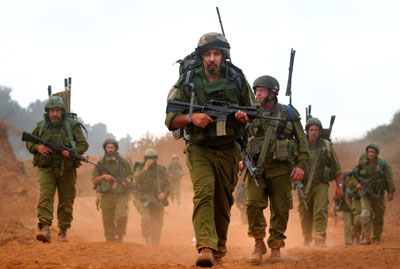|
Israel pushes ahead with offensive in Lebanon
(AP)
Updated: 2006-08-12 19:17
JERUSALEM -- Israel widened its ground war in Lebanon on Saturday,
almost tripling the number of troops there as it tried to seize more territory
and inflict as much damage as possible on Hezbollah guerrillas before a U.N.
cease-fire deal takes effect.
Long columns of Israeli tanks, troops and
armored personnel carriers streamed over the border.

Israeli soldiers walk
inside Lebanon near the southern town of Markaba during a ground operation
August 12, 2006. [Reuters] |
Under the
cease-fire deal, approved by the U.N. Security Council early Saturday, some
15,000 U.N. peacekeepers would deploy along the Israel-Lebanon border, along
with an equal number of Lebanese troops. The U.N. force would be able to use
force, as part of a strengthened mandate Israel had sought.
The U.N.
hopes to send the first contingent of troops in coming days, but no timetable
has been set yet, said Alvaro de Soto, a U.N. envoy to the Middle East. De Soto
said the U.N. forces would be deployed in tandem with Lebanese forces.
Currently, some 2,000 U.N. troops are stationed in the area, but with a
restricted mandate.
Israel's army chief, Lt. Gen. Dan Halutz, said
Saturday he expects the ground offensive to continue for another week. He said
Israel's troops would remain in south Lebanon until the international force
arrives.
Halutz said Israeli troops are fighting in all areas of
southern Lebanon. "We have almost tripled our forces operating in Lebanon," he
said. More than 10,000 troops were already fighting in Lebanon in the first
stage of the war, but have failed to halt Hezbollah rocket barrages on Israel.
Earlier this week, the Israeli Security Cabinet had approved the wider
offensive, up to Lebanon's Litani River, about 30 kilometers (18 miles) from the
border, or about twice the territory it controls now. Olmert had frozen the
campaign for two days to allow more time for diplomacy, but on Friday instructed
the military to go ahead.
The order came as the U.N. Security Council
was in the final stretches of reaching a truce deal, and Olmert's decision to
expand the war was seen as a means to pressure the negotiators. Israel was upset
with language that didn't give the U.N. troops a strong enough mandate to rein
in Hezbollah.
Olmert later endorsed an amended version, but Israeli
officials said the ground war would continue until a cease-fire has been
implemented. Israeli Vice Premier Shimon Peres welcomed the deal. "The
resolution itself is definitely good, maybe the best that could be gotten from
the U.N.," Peres told Israel TV's Channel Two.
Officials said the
continuing military operation was intended to further weaken Hezbollah and make
it easier for the U.N. and Lebanese troops to take over.
"The logic
would be that even in the framework of this successful outcome, if you hand over
to the Lebanese army a cleaner south Lebanon, a south Lebanon where you have
Hezbollah removed from the territory, that makes their (the Lebanese) troubles a
lot easier," said Israeli Foreign Ministry spokesman Mark Regev.
The
cease-fire deal posed a dilemma for Olmert.
Israel has been unable to
defeat Hezbollah and was concerned about growing Israeli casualties, as well as
international condemnation, if the war continued. However, Olmert also feared
that accepting a deal that does not rein in the guerrillas could lead to another
war down the road and hurt him politically.
Olmert has faced growing
criticism at home for the army's inability to halt the rocket barrages;
Hezbollah has fired more than 3,500 rockets in the monthlong war. Polls also
indicated that his initially approval rating, high at the start of the war, was
slipping.
Also Saturday, the army said one of its soldiers was killed in
fighting Friday, bringing the toll of military casualties since fighting started
on July 12 to 85.
|
| |
|
| |
|
|
|
| Most Commented/Read Stories in 48 Hours |
|
|
|
|